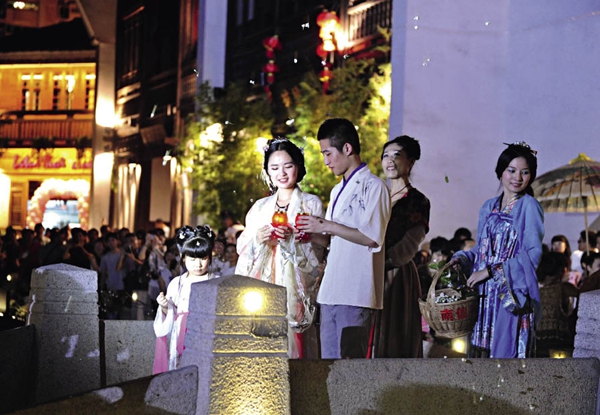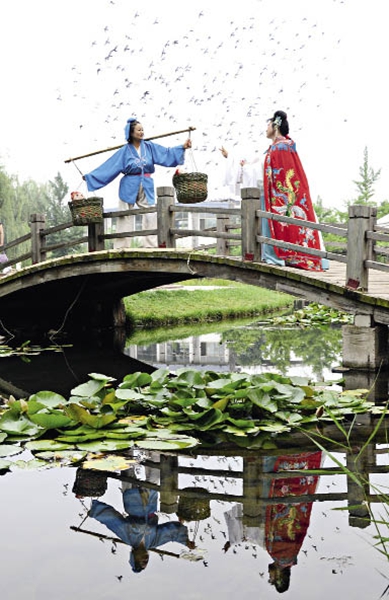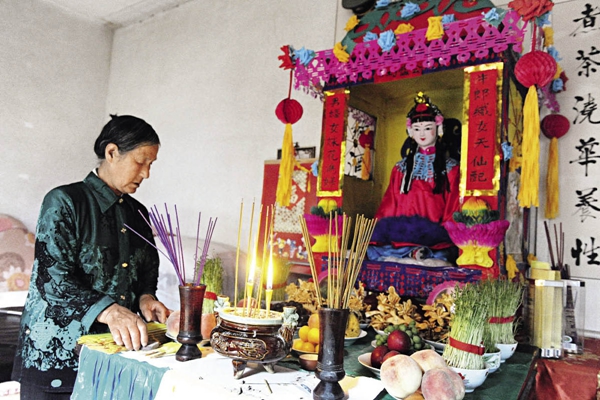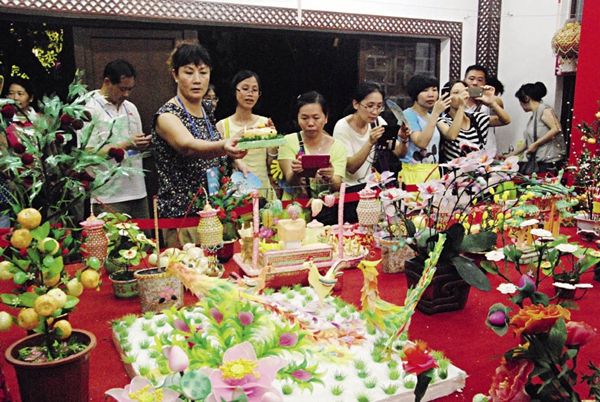THE Double Seventh Festival is celebrated in China and its neighboring countries that were historically under pervasive Sinitic influence. The name comes from the date – the seventh day of the seventh lunar month. Traditionally it was a holiday for girls, as a key custom of the day was to pray for sartorial excellence.
It is believed that the Double Seventh Festival first emerged in China during the Han Dynasty (202 BC - AD 220), and later spread to such countries as Japan, Korea, and Vietnam within the Sinosphere. It was listed as a national intangible cultural heritage in 2006.

Two lovers meet at the time-honored Antai Bridge in Fuzhou City on the Double Seventh Festival of 2012.
A Cowherd and a Weaving Maid
The story of Niulang (cowherd) and Zhinü (weaving maid) is one of the best-known love folklores in China. The immortal Weaving Maid of the heavenly court fell in love with a mortal farm boy during a stealthy visit to the Earth, and married him. They lived a happy idyllic life, and soon had a son and a daughter. On discovering their affair, which breached heavenly rules, the furious Queen Mother of the West sent her guards to seize the Weaving Maid, and bring her back. The distraught husband chased her through the heavens, carrying their two children. But before he could approach her, the Queen Mother used a hairpin to draw a line, creating a river (the Milky Way) between them, separating the two lovers permanently.
For years and decades the couple longingly looked at each other from either side of the river, eventually melting the Queen Mother’s heart of flint. She allowed them to meet once every year on the seventh day of the seventh lunar month. For this meeting, magpies would gather above the river to form a bridge across it, on which the two lovers would have their treasured moment of reunion.

The story of the Cowherd and the Weaving Maid is one of the best known love stories in China.
Two stars were named after the Cowherd and the Weaving Maid, respectively Altair and Vega in Western astronomy. In Chinese star maps of ancient times they are marked by a man leading a cow and a woman sitting before a spinning wheel.
Chinese people revere and admire the loyalty and perseverance of the two lovers. They look up into the starry sky on the night of the Double Seventh Festival to catch a glimpse of their once-in-a-year reunion. In old times young ladies prayed to them for talent in needlework and some maidens would hide under vines in hopes of overhearing conversations between the lovers, wishing they, too, would find true love.
In Jinhua of Zhejiang Province the tradition is to slaughter a rooster on the Double Seventh Festival. It is in the hope that in the absence of the cock’s crow that heralds the dawn, the couple might never be separated again.
Customs in Xihe, Gansu Province
Xihe County in Gansu Province has distinct customs for the Double Seventh Festival, or Skill Begging Festival. The Weaving Maid is known as the Goddess of Ingenuity among locals, and a series of celebrations are staged to pray for her dexterity from the night of the last day of the sixth lunar month to the night of the seventh day of the seventh lunar month.

A woman prepares the prayer table for the Double Seventh Festival in Xihe.
The festive activities are confined to fixed locales designated by conventions. Normally there are four to eight such sites in every town and one to four in every village. Meticulous preparations are made before a statue of the goddess is placed on the shrine, which marks the official commencement of the celebration.
One of the festival practices is for young men, young women and children to wear red string bracelets plaited into various patterns around their wrists. On the afternoon of the last day of the sixth lunar month, local girls untie these bracelets and entwine them into a rope that is then stretched across the nearest river, signifying the bridge for the Cowherd and Weaving Maid to cross the Milky Way. Meanwhile, incense and paper prayers are burnt, candles lit, and the crowds kowtow before singing a song called Erecting the Bridge in unison. At the end of the ceremony the two girls carrying the rope at either end loosen their grip, letting it fall into the river and be carried away.
Around 9 pm on the same day, the second ceremony kicks off. The young ladies, dressed to the nines and holding sticks of incense, escort the statue of the Weaving Maid, or Goddess of Ingenuity, to a meticulously selected host family while singing the song Greeting the Goddess of Ingenuity. They spend most of the following seven days and eight nights singing and dancing in front of the statue, exhibiting their feminine skills and expressing their wishes. Meant to entertain the goddess, these songs and dances are created by local women over many generations, and are reserved for this occasion.
This process is interspersed with auguring activities. One of them is to interpret the shadow that wheat or rice sprouts cast on the bottom of a bowl of water. The girls who produce the auspicious shadow sip from the bowl as a token of taking hold of the talent bestowed on them. This shadow augury, two to three hours in length, is the last procedure in the Double Seventh Festival other than more singing and dancing. When midnight strikes, the girls conclude the ceremony with the hymn Sending off the Goddess of Ingenuity. They then bid each other farewell. Some will get married in the following months, and so be disqualified from the next festival.
The Xihe customs of the Double Seventh Festival were designated as national intangible cultural heritage in 2010.
Customs in Tianhe, Guangzhou City
The people of Guangzhou call the Weaving Maid the Seventh Sister, as there are seven weaving maids in folklore. The Double Seventh Festival was historically a big event in the area, especially in the late Qing Dynasty (1644-1911) and early Republic of China period (1912-1949), when a street market opened prior to the day selling festival objects. Customs related to this festival still thrive in Tianhe, Panyu, and Huangpu districts of Guangzhou, best showcased in Zhucun Village of Tianhe District.

Locals of Tianhe attend a rite for the festival.
As the festival schedule is a busy one, Guangzhou girls start preparations three to four months prior to the seventh lunar month, making paper flowers, figurines, soaking cereals and beans to harvest their shoots, and preparing the prayer table amid other errands.
On the night of the sixth day of the seventh lunar month local young women set up a square table at the home gate or in the sitting room, and festoon it with handicrafts, fresh flowers, and fruits, as well as cosmetics.
On this and the next night the girls titivate, light incense and candles, and kneel down at the table to make seven kowtows, to the Weaving Maid, her six elder sisters, and the Cowherd. Next, they thread a needle in dim light. The one who first succeeds is believed to be blessed with needlework excellence.
A dining party for all girls of the community is part of the tradition of the festival to reinforce their friendship and to solicit the blessing of the Weaving Maid. In old times the better-off families staged a lavish dinner and invited all girls in the neighborhood, which was accompanied by live music. This custom has been preserved to date in Guangzhou but the diners are expanded to include not only young ladies but all members of a clan. Another recent addition to the tradition is the coming-of-age ceremony for girls. A highly revered matron of the region is invited by the girl’s family to conduct the rite, during which she pins up the girl’s hair as a symbol of her reaching adulthood.
The Tianhe legacy of the Double Seventh Festival was approved as a national intangible cultural heritage in 2011.
Customs in Shitang, Zhejiang Province
People of Shitang Town of Wenling City, Zhejiang Province, esteem the Weaving Maid as the guardian of children, and celebrate the seventh day of the seventh lunar month as her birthday, wishing for safe growth of their offspring. This day is, therefore, a holiday for those under the age of 16. The residents of Shitang are descendants of migrants from southern Fujian Province three centuries ago who carried their hometown traditions to the new settlement.

A Double Seventh performance in Shitang.
On the day, parents place a table at the home gate, and top it with paper models of pavilions and bridges, incense, candles, a bottle of wine, seven cups, and various foods. They then light three incense sticks and have their children make wishes (if the children are too young, the parents make the wish for them) before burning the paper models and setting off firecrackers. Before the paper structures are set on fire the children jostle to grab the figures within them.
Families with children aged one or aged 16 also invite relatives and friends to feast at home, and those whose children who will be 16 within the year make dumplings of glutinous rice as gifts for visitors.
The central ritual objects – paper pavilions and bridges – are ordered from professional craftsmen. They are made with bamboo strips, color paper, and clay. The pavilion is usually two stories high (the deluxe version is three) and contains a paper figure of a scholar on his way to the imperial exam on the ground floor. The pavilion is painted with a portrait of the Weaving Maid and characters from the local opera.
The Shitang customs for the Double Seventh Festival were enlisted as a national intangible cultural heritage in 2011.
(Compiled by China Today)
